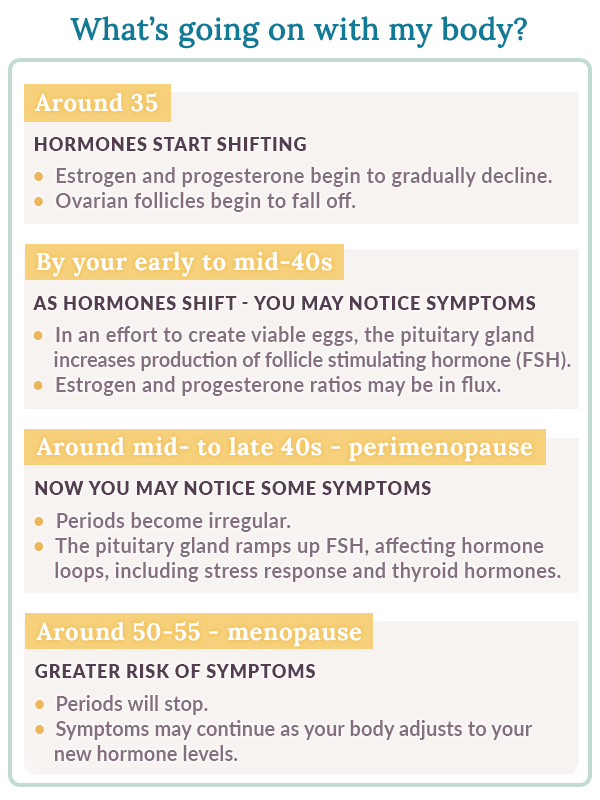Authored by Dr. Sharon Stills, NMD
As we move through hormonal changes, so many women ask “How do I know if I’m in menopause?” That’s because the symptoms you’re dealing with today can be frustrating and confusing and you want to know what’s causing them.

Some of the confusion is linked to the fact that there’s no single moment that confirms you’re entering menopause. Instead, you experience a gradual transition through perimenopause (the time leading up to menopause) to menopause, which is defined as one year after your last period.
By the time many women “officially” start menopause, they’ve been experiencing symptoms for some time — ranging from several months to more than 10 years. That’s because your hormones start to shift and fluctuate long before your period stops.
Where are you in this transition? Take a look at the chart below to see a rough progression of the hormonal changes that may be taking place in your body right now. Remember that every woman is unique, and that the severity and frequency of symptoms depends a great deal on how much support you’re giving your body.

Are you in perimenopause or menopause? Take a look at your individual symptoms
You may not realize that in addition to hot flashes, night sweats and even vaginal dryness, there are many other symptoms connected to hormonal changes, such as anxiety, mood swings and irritability in menopause or perimenopause. What’s more, because there aren’t accurate medical tests to determine whether you’re in perimenopause or menopause, the best way to know is to consider the number and severity of the symptoms you are experiencing.
How many symptoms are you experiencing as a result of menopause or perimenopause? Take a look at the symptom list below. You may also want to take our short Menopause Quiz to better understand how your symptoms are affecting your life and what you can do to feel better.
Symptoms of perimenopause and menopause
- Irregular periods
- Hot flashes and/or night sweats
- PMS-like symptoms (cramps, bloating, breast tenderness, headaches and/or irritability)
- Sleep difficulties
- Fatigue and/or loss of energy
- Feeling sad, moody or overwhelmed
- Feeling anxious, having anxiety attacks or temporary heart palpitations
- Feeling forgetful, fuzzy minded or confused
- Irritability or just not feeling like yourself
- Bloating, gas, diarrhea, constipation or nausea
- Stiff or achy joints
- Weight gain, especially around the middle
- Loss of libido or a change in sexual desire
- Vaginal dryness
- Cravings (sweets, carbohydrates, etc.)
- Thinning hair or hair loss
Menopause — or not — you can feel the way you want
Whether you believe you’re close to menopause, in perimenopause or not, we encourage you to focus on finding the way to feel your best.
Think of your menopause or perimenopause symptoms simply as messages from your body communicating that something is out of balance. What’s important to know is that there’s a lot you can do to support your body to naturally regain balance. As you do this, you will decrease your symptom frequency and severity (and in some cases even regain normal periods and cycles) so you can get back to your life and have a little more fun every day.
No matter where you are in your hormonal journey, we can help you feel strong, energetic and symptom-free.
References and further reading
Ojeda, Linda. 2000. Menopause Without Medicine, revised 4th edition, 28-34, CA: Hunter House Publishers.
Lovick, TA. 2012. Estrous cycle and stress: influence of progesterone on the female brain. Braz J Med Biol Res, 45(4), 314-320.
Freeman, EW. 2005. The role of anxiety and hormonal changes in menopausal hot flashes. Menopause, 12(3), 258-66.
Prior, JC. 2012. Midlife Muddle—Own the Power of Naming.











